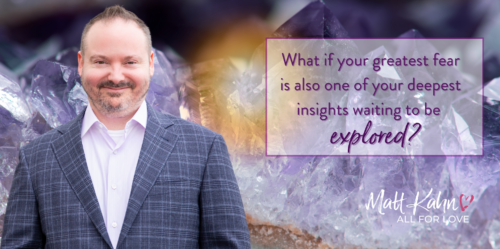 by Matt Kahn
by Matt Kahn
(email)
From as early as I can remember, I have always been afraid of one thing — being too much for people. As I regularly confused other people’s experiences of life with their perception of me, I became hypercritical of myself. As if anything I said or did somehow pushed others away or motivated their rejection and abandonment.
This caused me to shapeshift in various social settings, hoping to quickly find the perfect combination of interests and attributes that allowed others to approve of me. While I learned how to be “All things to all people,” the fundamental downside of this was realizing I couldn’t ever receive the approval offered by others because I wasn’t being the most authentic me in my experiences.
It’s a strange chapter of growth, even as a kid, when realizing you can fool others into validating whichever mask you assume will be most attractive to them, while not being able to let any of it in, which can only occur when daring to be your most authentic self.
At such a young age, I knew how to win the prize, but was so far away from knowing how to feel it in a meaningful way.
After years of shapeshifting for other people’s validation without knowing why I couldn’t feel it, or even when daring to be myself, why I felt invisible to the world, somehow overlooked by life, dismissed by others, and overwhelmed by those I just wanted to be loved by — a rather intriguing insight dropped in.
It asked me, “What if your greatest fear is also one of your deepest insights waiting to be explored?”
While I initially scoffed at such a seemingly absurd idea, the voice furthered, “Nothing else seems to work, so why not give it a try?” “Sure,” I thought. It couldn’t be any worse than the Groundhog’s Day I seem to be destined to live out, so I opened to this awareness.
Immediately, as if I was watching images of my life being pieced together in a different order, I was taken through a mini life review and began seeing things differently.
I saw how frustrated my parents were when the emotional sensitivities of their empathic child couldn’t be resolved through their rescuing. I viewed a replay of the spiritually-focused questions a Rabbi had not been prepared to answer as he taught Sunday school. I watched as kids turned away in avoidance of the emotions that inspired more curiosity than fear in me. I recalled schoolteachers telling me to “Just be a kid,” while in moments of existential crisis.
And then, it all came full circle as I suddenly realized, “I have only been too much for others because this is who I have insisted to be validated by. How would my life change if I realized that I’ve never been too much for myself? What if this is where true validation is found?”
While it would take years to process, unpack, and fully digest this insight, it created a bold pattern-interrupt from self-abandonment — no longer requiring others to deny me as a way of returning me back to myself. It wasn’t a “To hell with people, they only disappoint and leave you” type of thought.
Instead, it was a heartfelt, soul-nourishing realization that I’ve never been too much for myself, but equally, I hadn’t spent enough quality time with myself to know how validating time with me could be.
I certainly thought I had spent enough time with myself, but in truth, the majority of time spent alone involved pining for the approval of others, judging those I felt judged by, conspiring to create newer masks that maximize approval and minimize rejection, and wondering why I felt so invisible to the world around me.
It was because I had confused steeping in the despair of loneliness with getting to know myself as Spirit in form. The more I learned to separate my experiences in life from the one experiencing them from within, the more validated I felt in my own presence, which led to being seen and valued by others around me.
The difference was, I wasn’t getting to know myself as a way of stacking the deck of other people’s approval more in my favor.
I had simply played out patterning to such an exhaustive degree, there was nothing left to consider but taking a different approach.
Whether this matches a fear equally hiding in you, or offers new perspective about a life that has felt like more of a struggle than a celebration, your life can and will dramatically shift, once you realize: You are never too much for yourself. Those are merely imprints of other people’s experiences with themselves that were projected onto you or interpreted by the loneliness of perpetual despair.
No matter how often you feel like you are too much for others, you are never too much for Source. Since you cannot ever be too much for Source to handle, you are never too much for me.
I see you. I know you. I feel you. I am you. I love you — from my empathic heart to yours.
All for Love,
Matt

